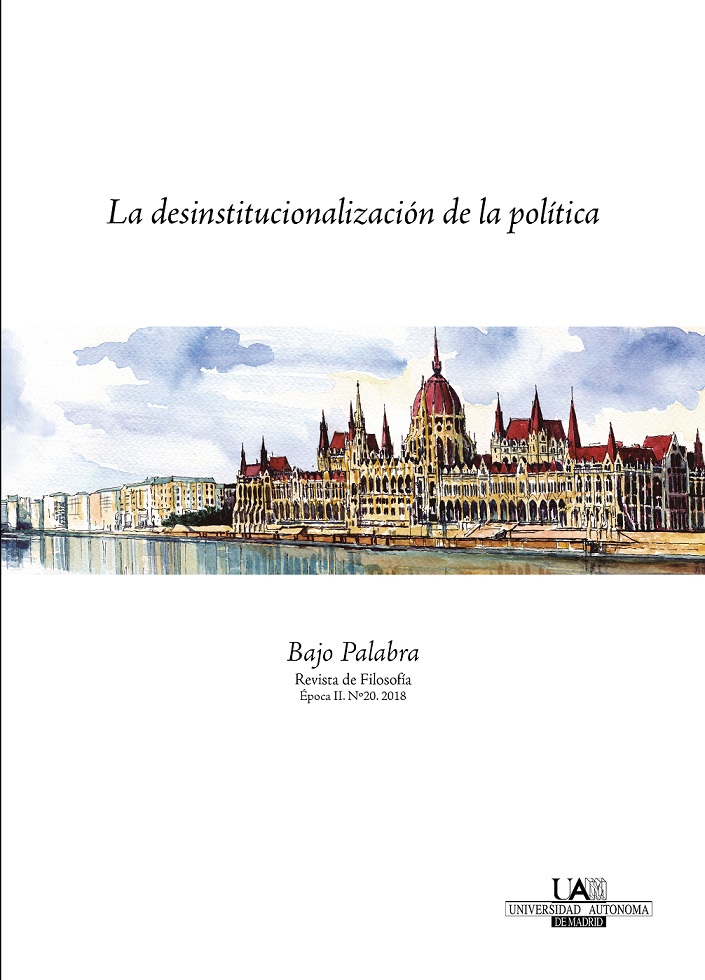(De)institutionalization, Politics and Transnational Feminist Movement. A Complex Question in the Light of the Struggles of the Present
Keywords:
deinstitutionalization, transnational feminism, political agenda, equality policies.Abstract
Approaching the processes of institutionalization and deinstitutionalization motivated by the feminist movement is an enormous task, but the construction and progression of its agenda, around the fiht against gender violence and the struggle for equality, allows us to glimpse its political objectives of the last thirty years. Situated in the worrying political present of the rise of the ultra-right, I present the paradox of a movement that has never shown greater strength, but that does so within an extremely hostile political and economic constellation. On the one hand, feminism has developed virally on a horizontal plane in which the organization has been allergic to hierarchies. On the other hand, linked to the institutionalization of equality policies, it has made progress, but it has also harvested ambivalences and rejections. Advancing the characterization of transnational feminism and its agendas since the 1990s is an ongoing research task that cannot ignore the need to articulate a political response to the ongoing anti-feminist reactionDownloads
References
AGRA, M. X. “Vulnerabilidad: injusticias y cuidados” en M. L. BOLADERAS (Ed.) Bioética: justicia y vulnerabilidad. Barcelona, Proteus, 2013, pp. 49-82.
— ¿Olvidar a Clitemnestra? Sobre justicia e igualdad. Santiago de Compostela, USC editora. 2016
AMORÓS, C. Mujeres e imaginarios de la globalización. Rosario, Argentina, Homo Sapiens. 2008
AMORÓS, C. Y POSADA, L. Feminismo y multiculturalismo. Madrid, Instituto de la Mujer. 2007
BENHABIB, S. Los derechos de los otros. Extranjeros, residentes y ciudadanos. Barcelona, Gedisa. 2004
— Dignity in Adversity. Human Rights in Troubled Times. New York, Polity Press. 2011
BROWN, W. El pueblo sin atributos. La secreta rebelión del neoliberalismo. México: Malpaso. 2015
EMCKE, C. Contra el odio. Madrid. Taurues. 2017
FEMENIAS, M.L. El género del multiculturalismo. Bernal. Universidad de Quilmes. 2007
FRASER, N. Fortunes of Feminism. From State-Managed Capitalism to Neoliberal Crisis. London: Verso. 2013
— “Las contradicciones del capital y los cuidados” en New Left Review, 100, septiembre-octubre, (111-132). 2015
— Entrevista recuperada en traducción al español en: http://www.laizquierdadiario.com/Nancy-Fraser-el-feminismo-del-99-y-la-era-Trump.
HONDAGNEU-SOTELO, P. Domestica: Immigrant Workers Cleaning and Caring in the Shadows of Afflnce. California University Press. 2007
Hochschild, A. R. Extraños en su propia tierra. Réquiem por la derecha estadounidense. Madrid. Capitán Swing. 2018
GUERRA PALMERO, M. J. «Apostar por el feminismo global», en Leviatán. Revista de Hechos e Ideas, núm. 80, 2000, pp. 101-116.
— «¿Es inevitable el etnocentrismo? Aportaciones feministas a un debate en curso», en Thémata, Revista de Filosofía, núm. 39, 2007, pp. 59-65.
— (2007) «Feminismo transnacional o feminismo global: autoritarismo, poder y pluralidad», en Cuaderno Gris, Revista de Filosofía de la Universidad Autónoma de Madrid, núm. 9, en la edición Democracia, Deliberación y Diferencia, a cargo de Mariano C. Melero, pp. 243-260.
— (2008) «Culturas, género y violencia: prácticas lesivas y derechos de las mujeres», en Isegoría. Revista de Filosofía Moral y Política, núm. 38, pp. 61-76.
— (2010) «Justicia global y analítica de las desigualdades. Pobreza y género», en Isegoría. Revista de Filosofía Moral y Política, núm. 43, pp. 271-282.
— (2014) «Feminismo transnacional, globalización y derechos humanos», en Dilemata. Revista Internacional de Éticas Aplicadas, núm. 15, pp. 161-169.
GUTIÉRREZ, G. Perspectiva de género: cruce de caminos y nuevas claves interpretativas. Ensayos sobre feminismo, política y fiosofía. México, M.Á. Porrúa/PUEG/UNAM, 2002.
JAGGAR, A. (2009) “Transnational Cycles of Gendered Vulnerability: A Prologue to a Thory of Global Gender Justice” Philosophical Topics, Vol. 37, No. 2, Global Gender Justice (FALL), pp. 33-52.
NUSSBAUM, M. Las mujeres y el desarrollo humano. Barcelona. Herder. 1999
MENÉNDEZ ESPINA, S. (2017) «Trabajos femeninos: el valor de los cuidados».Enlace: http://ctxt.es/es/20170823/Politica/14515/workforall-ctxtprecarizacion-trabajo-domestico-economia-reproductiva.htm
RIEMEN, R. Para combatir esta era. Consideraciones urgentes sobre fascismo y humanismo. Madrid. Taurus. 2018
TRAVERSO, E. Las nuevas caras de la derecha. Madrid, Siglo XXI. 2018
SÁNCHEZ, C. “Sobre el mal y las violaciones masivas contra las mujeres.
Aproximaciones desde filósofas contemporáneas”, en QUESADA, F. Mujeres y guerra. Cuerpos, territorios y anexiones, Biblioteca Nueva, Madrid. 2014
SEGATO, R. Las nuevas formas de la guerra y el cuerpo de las mujeres. México, Ed. Pez en el árbol. 2014
— La guerra contra las mujeres. Madrid: Traficantes de Sueños. 2016
VALCÁRCEL, A. Feminismo en un mundo global. Madrid, Cátedra. 2008
VEGA, C. (2017) ¿Quién teme al feminismo? A propósito de la “ideología de género” y otras monstruosidades sexuales en Ecuador y América Latina” Recuperado en: http://www.sinpermiso.info/textos/quien-teme-al-feminismo-a-proposito-de-la-ideologia-de-genero-y-otras-monstruosidades-sexuales-en
YOUNG, I. M. La justicia y la política de la diferencia. Madrid: Cátedra. 2000
YUVAL-DAVIS, N. Gender & Nation. London, Sage. 1997
